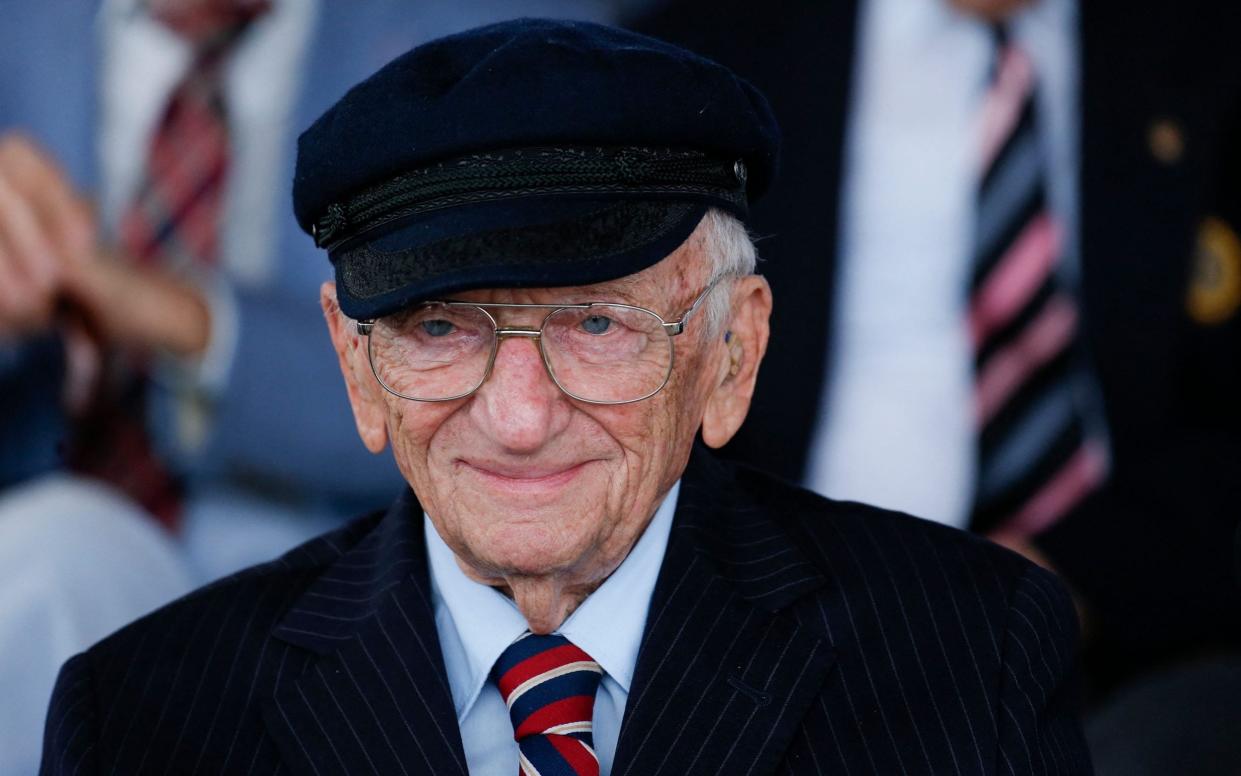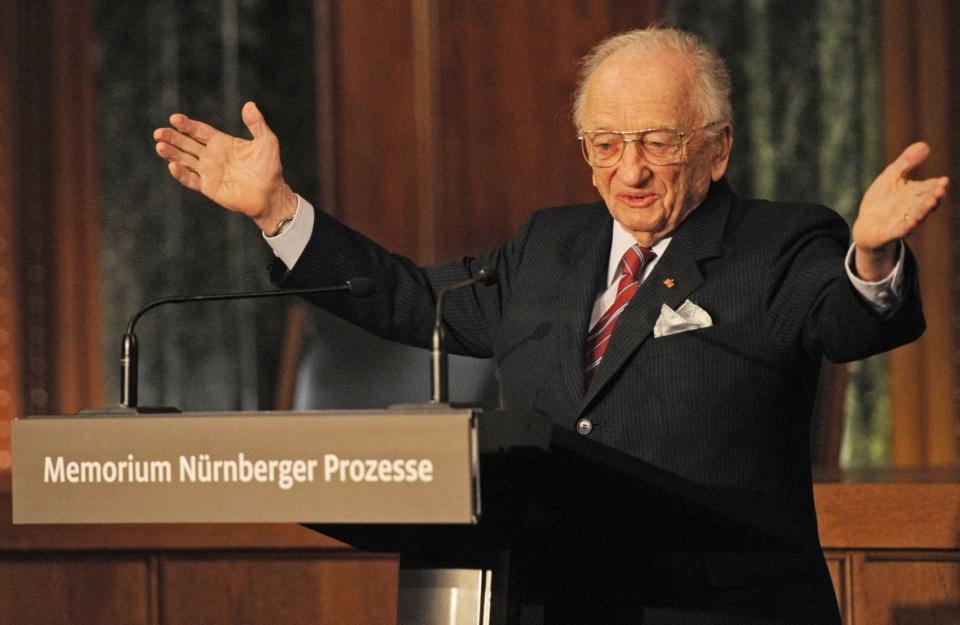Benjamin Ferencz, last surviving prosecutor at the Nuremberg war-crimes trials – obituary

- Oops!Something went wrong.Please try again later.
Benjamin Ferencz, who has died aged 103, was the last surviving prosecutor at the Nuremberg war-crimes trials, and spent much of the rest of his life campaigning for the establishment of an International Criminal Court, a campaign crowned with success in 2002.
In 1945 Ferencz was removed from the US anti-aircraft artillery battalion in which he had been serving as a corporal and transferred to the headquarters of General Patton’s Third Army, where he was assigned to a team tasked with setting up a war-crimes branch and collecting evidence for prosecutions. “I was plucked out because I had done research for a Harvard law professor for a book on war crimes,” he recalled. “I had read every book on war crimes in the Harvard law library.”
As the war in Europe ended, Ferencz – a Jew who had lost a grandmother, aunts and uncles to the Germans – travelled throughout Germany to gather evidence of atrocities. With his bare hands, he dug up bodies of young American pilots beaten to death by German mobs, and examined piles of burnt and decaying flesh in Nazi concentration camps. He was sent to scour Nazi archives in Berlin and concentration camps and became one of the first to examine German government documents related to the Holocaust. “I had peered into Hell,” he recalled.
When his job was done, he returned to New York to practise law. But in 1947 he was recruited by the Nuremberg principal prosecutor Telford Taylor, and in September was the chief prosecutor for the US in the Einsatzgruppen (“action groups”) Case. Described as “the biggest murder trial in history” by the press, this was the prosecution of 22 members of the infamous SS death squads whose job had been to follow the German army as it invaded the Soviet Union in 1941 and kill Communists, Gypsies and especially Jews. Ferencz had unearthed first-hand evidence that they had murdered more than a million people.
It was Ferencz’s first case; he was 27 years old and, at just over five feet tall he had to stand on a pile of books to see over the lectern and face the Nazi defendants. But the case was a straightforward one: thanks to his researches in Third Reich archives he had to hand a cache of top-secret documents. Unearthed in the ruins of the German foreign ministry, they consisted of daily reports, many signed by the defendants themselves, charting the activities of the Einsatzgruppen.
These included, for example, Exhibit 111: “In the last ten weeks, we have liquidated around 55,000 Jews.” Exhibit 179, from Kiev in 1941, reported that “the city’s Jews were ordered to present themselves. About 34,000 reported, including women and children. After they had been made to give up their clothing and valuables, all of them were killed, which took several days.”
Exhibit 84, from Einsatzgruppen D in March 1942, noted: “Total number executed so far: 91,678.” Einsatzgruppen D was the unit of Ferencz’s lead defendant Otto Ohlendorf, who did not deny the killings, claiming they had been done in self-defence.
“I was able to rest my case after two days without calling a single witness,” Ferencz recalled. “The top-secret documents were indisputable.”
All 22 defendants were found guilty of crimes against humanity and war crimes; 13 were sentenced to death, of whom only four, including Ohlendorf, were hanged. Yet thousands of Germans had served with the Einsatzgruppen, most of whom were never charged and returned unremarked to civilian life.
But as Ferencz stated in his opening remarks: “Vengeance is not our goal, nor do we seek merely a just retribution. We ask this court to affirm by international penal action man’s right to live in peace and dignity regardless of his race or creed. The case we present is a plea of humanity to law.”
He was discriminating in his choice of those to stand trial, selecting them on the basis of education and rank. “I had many PhDs and many generals. In ordinary times, they would have been respected citizens. Instead, without any remorse whatsoever, they murdered thousands of Jewish children one shot at a time.” They were not, as he put it, “villains with big horns and big teeth”, but men who “could quote Goethe, who loved Wagner, who were polite” – they were intelligent human beings acting in what they believed to be the best interests of their country.

“We never intended to try all those criminals that were responsible for the crimes. It was a sampling of the top people to show how such a society could exist in a civilized continent,” he explained later.
Ferencz became convinced that “war makes murderers out of otherwise decent people – all wars, and all decent people.” After the war, he campaigned to establish an International Criminal Court which, unlike ad hoc war crimes tribunals, would function like a permanent Nuremberg, prosecuting war crimes, genocide, and crimes against humanity in cases where national governments are unable or unwilling to do so themselves.
The court was established in The Hague in 2002, and in 2018, along with his son Donald, Ferencz was successful in getting the crime of aggression added to the ICC Statute. But he expressed disappointment at the pace of progress; since its foundation the court has indicted only 44 people and opened investigations in 11 countries, all bar one in Africa, and several countries, notably the United States, refuse to recognise its authority.
“Law not War” remained Ferencz’s motto. He saw aggressive war as the “supreme international crime”, and in 2009 argued that George W Bush and Tony Blair should be tried, along with Saddam Hussein, for their invasion of Iraq. But it was not to be.
Benjamin Berell Ferencz was born on March 11 1920 into poverty in the Carpathian mountains of Transylvania, Romania. His father was a shoemaker; both parents were illiterate. When he was 10 months old, his father uprooted the family and moved them to New York, where they lived in a basement in the crime-ridden Hell’s Kitchen district of Manhattan.
A gifted student, Ferencz won a scholarship to Harvard University, where he read Law. But during his first term, in December 1941, the Japanese bombed Pearl Harbor and like many of his classmates he tried to enlist. He wanted to be a pilot, but the Army Air Corps would not take him because his feet could not reach the pedals. The Marines, he recalled, “just looked at me and said, forget it, kid”.
So he completed his degree then enlisted as a private in the Army in 1943. Part of an artillery battalion, he landed on the beaches at Normandy, broke though the Maginot and Siegfried lines and fought in the Battle of the Bulge, before being transferred to the unit set up to investigate war crimes.
Without Ferencz’s intervention the Einsatzgruppen trial might never have happened. “The case had not been planned,” he recalled. “When we discovered this evidence, I brought it to General [Telford] Taylor, and I said we have to put on a new trial, and he said we can’t.” The Pentagon had already planned its schedule of trials and the war-crimes division faced staffing shortages and budget limitations. “I said, ‘We can’t let these mass murderers go free – I have the evidence here in my hands’. And he said, ‘Can you do it in addition to your other work? OK, you be the prosecutor.’ ”
Ferencz remained in Germany for eight years, working to establish restitution for those whose assets had been stolen by the Nazis. He played a part in the negotiations that led to the Reparations Agreement between Israel and West Germany in 1952 and the first German Restitution Law in 1953. He was one of the first to defend the rights of Jewish forced-labourers who had worked for German companies during the war in their battle for compensation – a battle which only began to bear fruit in the 1990s, after the death of many of the former slaves.
Ferencz wrote about his experience in his book, published in 1979, Less Than Slaves: Jewish Forced Labor and the Quest for Compensation. In 1996 Ferencz’s book would be quoted during the row that erupted in Britain over the endowment of a professorship in European Thought at Balliol College, Oxford, by Dr Gert-Rudolf Flick, the grandson of Friedrich Flick, who was convicted as a war criminal at Nuremberg for having used some 48,000 mainly Jewish slave labourers in his factories and mines during the Nazi period, of whom about 40,000 died in appalling conditions.
After the war Flick became the main shareholder in Daimler-Benz. Ferencz had revealed that Friedrich Flick had never paid a penny to the survivors, despite years of pleading, recognising no moral claim on a fortune derived from his crimes.
Back in New York, Ferencz specialised in international law in a private legal practice, but after 13 years, disgusted by America’s involvement in the Vietnam War, which he felt was “crazy and should be illegal,” he left his law practice to dedicate himself to establishing a legal framework for world peace. He wrote several books on the subject, most notably Defining International Aggression: The Search for World Peace (1975), in which he argued for the creation of an international criminal court. From 1985 to 1996, Ferencz also worked as an Adjunct Professor of International Law at Pace University, White Plains, New York.
In 2000 he co-wrote an op-ed piece in the New York Times, urging the then-president Bill Clinton to become an ICC signatory, which he did, though the US has yet to ratify the document. His co-author, astonishingly, was Robert McNamara, a man whom many regard as a war criminal for his role as the architect of US involvement in Vietnam (he died in 2009). McNamara, Ferencz recalled, told him that had an ICC existed during his term as Secretary of Defense, he might never have acted as he did.
Ben Ferencz lived long enough to participate in the first case before the ICC. Aged 92, he gave a closing statement in the prosecution of the Congolese warlord Thomas Lubanga Dyilo.
Ferencz lived simply, saving what he earnt from his salary and cases unrelated to war victims, and in 2016 he announced that he would be donating $1 million to the Simon-Skjodt Center for the Prevention of Genocide in the US Holocaust Memorial Museum in Washington on an annually renewable basis. “I wanted to show appreciation to the United States for the opportunity they gave me as a poor immigrant boy from Transylvania by giving back everything that I have before I leave,” he explained.
Ferencz was awarded numerous medals and honours including the French Légion d’honneur, Germany’s military medal of honour, the Dutch Erasmus Prize, the Martin Luther King Jr Nonviolent Peace Prize and in 2022 the US Congressional Medal of Honour.
In 2017 The Hague named a path after him and the following year hosted a ceremony at which Ferencz presented a wooden bench, emblazoned with the metal letters “LAW NOT WAR”, which now stands outside the Peace Palace building.
Ferencz and his wife Gertrude, whom he married in 1946, had four children; she died in 2019.
Benjamin Ferencz, born March 11 1920, died April 7 2023

